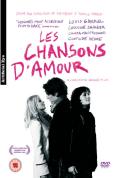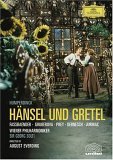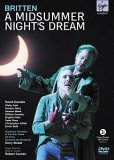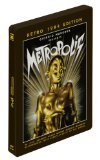![Rosenkavalier - Strauss [1979]](/pictures/1027864.jpg) Rosenkavalier - Strauss | DVD | (15/08/2005)
from £N/A
| Saving you £N/A (N/A%)
| RRP
Rosenkavalier - Strauss | DVD | (15/08/2005)
from £N/A
| Saving you £N/A (N/A%)
| RRP Comedy for music in three acts.
![Chungking Express [1995]](/pictures/1001418.jpg) Chungking Express | DVD | (28/06/2004)
from £N/A
| Saving you £N/A (N/A%)
| RRP
Chungking Express | DVD | (28/06/2004)
from £N/A
| Saving you £N/A (N/A%)
| RRP Chungking Express tells two stories loosely connected by a Hong Kong snack bar. In one, a cop who's been recently dumped by his girlfriend becomes obsessed with the expiry dates on cans of pineapple; he's constantly distracted as he tries to track down a drug dealer in a blonde wig (played by Brigitte Lin, best known from Swordsman II and The Bride with White Hair). Meanwhile, another cop who's recently been dumped by his girlfriend (Tony Leung Chiu-Wai, from John Woo's Hard-Boiled and A Bullet in the Head) mopes around his apartment, talking to his sponge and other domestic objects. He catches the eye of a shop girl (Hong Kong pop star Faye Wang) who secretly breaks in and cleans his apartment. If you're beginning to suspect that neither of these stories has a conventional plot, you're correct. What Chungking Express does have is loads of energy and a gorgeous visual style that never gets in the way of engaging with the charming characters. The film was shot on the fly by hip director Wong Kar-Wai (Happy Together, Ashes of Time), using only available lighting and found locations. The movie's loose, improvisational feel is closer to Jean-Luc Godard's Breathless than any recent film--and that's high praise. Quirky, funny, and extremely engaging, Chungking Express manages to be experimental and completely accessible at the same time. --Bret Fetzer, Amazon.com
![Two Orphan Vampires (Limited Edition 4K UHD) [Blu-ray] [1997] [Region Free]](/pictures/1162042.jpg) Two Orphan Vampires (Limited Edition 4K UHD) | Blu Ray | (08/05/2023)
from £26.98
| Saving you £N/A (N/A%)
| RRP
Two Orphan Vampires (Limited Edition 4K UHD) | Blu Ray | (08/05/2023)
from £26.98
| Saving you £N/A (N/A%)
| RRP Originally released in 1997, Two Orphan Vampires (Les Deux orphelines vampires) finds Jean Rollin, the master of the fantastique, returning to the vampire genre with which he had made his name. By day, blind orphans Henriette and Louise seem to be the picture of innocence. But when darkness falls, their sight returns, and they wander the streets of Paris, encountering the city's strange nocturnal denizens, and leaving a trail of corpses in their quest for fresh blood. Featuring startling performances from novice leads Alexandre Pic and Isabelle Teboul, alongside Tina Aumont (Modesty Blaise) and Rollin regulars Nathalie Perrey (The Shiver of the Vampires) and Brigitte Lahaie (Fascination), Two Orphan Vampires is a beautiful and melancholy summation of Rollin's unique and arresting style. Product Features New 4K HDR restoration from the original negative by Powerhouse Films 4K (2160p) UHD presentation in Dolby Vision (HDR10 compatible) Original French and English mono soundtracks Audio commentary with critics and authors David Flint and Adrian J Smith (2023) Memories of a Blue World (2023): updated documentary on the making of Two Orphan Vampires by Rollin's personal assistant, Daniel Gouyette, featuring interviews with actor Isabelle Teboul, assistant director Jean-Noël Delamarre, composer Philippe D'Aram, and others Jean Rollin on 'Two Orphan Vampires' (2002): extensive, newly edited archival interview with the filmmaker exploring the themes of Two Orphan Vampires and his wider oeuvre Interview with Alexandra Pic (2002): newly edited archival interview with the actor Interview with Isabelle Teboul (2002): newly edited archival interview with the actor Original theatrical trailer Image gallery: promotional and publicity materials New and improved English translation subtitles for the French soundtrack New and improved English subtitles for the deaf and hard of hearing Limited edition exclusive 80-page book with a new essay by Patricia MacCormack, archival introduction by Jean Rollin, archival production report by Peter Blumenstock, archival interview with Brigitte Lahaie, an extract from Rollin's source novel, an overview of contemporary critical responses, and full film credits World premiere on 4K UHD Limited edition of 8,000 numbered units (4,000 4K UHDs and 4,000 Blu-rays) for the UK and US All extras subject to change
 Chansons D'Amour | DVD | (14/04/2008)
from £19.80
| Saving you £0.19 (0.96%)
| RRP
Chansons D'Amour | DVD | (14/04/2008)
from £19.80
| Saving you £0.19 (0.96%)
| RRP An unforgettable celebration of love loss and new beginnings Les Chansons d'Amour is a joyful homage to the French New Wave and Jacques Demy's classic The Umbrellas of Cherbourg. Louis Garrel plays Ismael a young man at the centre of a mnage-a-trois with his long-time girlfriend Julie (Ludivine Sagnier) and his work colleague Alice (Clotilde Hesme). But Ismael is feeling restless and Julie confides in her sister (Chiara Mastroianni) that she is unhappy with the situation; shortly after fate intervenes and profoundly changes the destinies of all concerned. Beautifully photographed on the streets of Paris and featuring songs by acclaimed musician Alex Beaupain - brilliantly sung by the cast - Christophe Honor's beguiling film is a vibrant tale of longing and romance.
![Munchhausen [1943]](/pictures/1002305.jpg) Munchhausen | DVD | (18/08/2003)
from £18.92
| Saving you £2.33 (13.19%)
| RRP
Munchhausen | DVD | (18/08/2003)
from £18.92
| Saving you £2.33 (13.19%)
| RRP Enjoying the dubious billing of being the Third Reich's "finest fictional moment", Münchhausen lives up to the hype. Commissioned by propaganda minister Joseph Goebbels to mark the 25th anniversary of the UFA film studio in 1943, director Josef von Baky was given every incentive artistic, technical and financial to create a state-of-the-art film outflanking Hollywood--and, in most respects, he succeeded. Hans Albers is understatedly right as the buccaneer aristocrat, his adventures over the centuries made possible by preternatural longevity. Hermann Speelmans gives sterling support as loyal manservant Kuchenreutter, while Brigitte Horney has appealing decadence as Catherine the Great. The spectacular Venice canal sequence and whimsical moon episode are balanced by strong scriptwriting from "Berthold Bürger" (Erich Kästner of Emil and the Detectives fame), with Georg Haentzschel's lushly eclectic score scarcely inferior to those by his more famous Hollywood counterparts. A tendency to send-up non-German nationalities hints at Nazi ideology, but otherwise this is pure--though never soulless--escapism, produced to the highest artistic standards. On the DVD: Münchhausen on disc is presented in a restored print which recaptures the original's breathtaking interplay of colour, and the soundtrack has been very adequately cleaned up. Just eight access points and subtitles in English only, but a photo gallery of over 100 stills and memorabilia to chart the course of the film in detail. R Dixon Smith's insightful documentary feature gives the lowdown on why the film was made. All the more remarkable, then, that it's survived the vicissitudes of its era so handsomely. --Richard Whitehouse
![Education Anglaise [Blu-ray] [2024]](/pictures/1164934.jpg) Education Anglaise | Blu Ray | (04/03/2024)
from £14.99
| Saving you £N/A (N/A%)
| RRP
Education Anglaise | Blu Ray | (04/03/2024)
from £14.99
| Saving you £N/A (N/A%)
| RRP  Humperdinck - Hansel Und Gretel (Solti, Vpo) | DVD | (14/11/2005)
from £16.05
| Saving you £5.20 (35.16%)
| RRP
Humperdinck - Hansel Und Gretel (Solti, Vpo) | DVD | (14/11/2005)
from £16.05
| Saving you £5.20 (35.16%)
| RRP Engelbert Humperdinck's beloved musical fairy tale is brought to life by Sir Georg Solti and an illustrious cast - all part of a shimmering production that continues to enchant audiences of all ages.
![The Rainer Werner Fassbinder Collection Vol. 2 [Limited Edition] [Blu-ray]](/pictures/1156925.jpg) The Rainer Werner Fassbinder Collection Vol. 2 | Blu Ray | (06/12/2021)
from £49.99
| Saving you £N/A (N/A%)
| RRP
The Rainer Werner Fassbinder Collection Vol. 2 | Blu Ray | (06/12/2021)
from £49.99
| Saving you £N/A (N/A%)
| RRP Rainer Werner Fassbinder, the enfant terrible of the New German Cinema, wrote, directed, produced and starred in over 40 films in his short but prolific life, before passing away of a drugs overdose in 1982 aged just 37. Rainer Werner Fassbinder vol. 2 brings together a collection of his key works from the mid-section of his career in high definition digital restorations prepared by the Rainer Werner Fassbinder Foundation. Among Fassbinder's best-loved works, Fear Eats the Soul sees the director paying homage to the classic melodramas of Douglas Sirk in its poignant portrayal of a relationship between a widowed cleaning lady in her sixties and a Moroccan immigrant in his thirties that causes an outrage with her family, friends and neighbours. Fassbinder's long-gestating adaptation of Theodor Fontane's classic German novel Effi Briest, his most expensive production to date as well as one of his most ambitious, tells the tale of a seventeen-year-old girl who is married off by her parents to a wealthy Baron more than twice her age. Fassbinder himself plays the protagonist of Fox and His Friends, a sweet working class soul whose relationship with wealthy industrialist Eugen, he discovers, is based almost wholly on his unexpected lottery win. Chinese Roulette is a tense psychodrama set in an isolated house during a weekend break in which infidelities are revealed and families break down. Fassbinder's international breakthrough film, The Marriage of Maria Braun charts the rise to prosperity of its tenacious and pragmatic central character across the post-war years as she holds out hope for the return of the young soldier she was married to for less than 24-hours before he was dispatched to the Russian front and later reported dead. Limited Edition Contents High definition digital transfers of all films prepared by the Rainer Werner Fassbinder Foundation High Definition (1080p) Blu-rayTM presentations of all films Original uncompressed PCM mono 1.0 sound for all films Optional English subtitles for all films Exclusive 140-page collectors booklet containing archive articles and new writing by Deborah Allison, Geoff Andrew, Margaret Deriaz and Travis Miles. Disc One Fear Eats The Soul Audio commentary by critic and lecturer Mark Freeman My Name is Not Ali, Viola Shafik's 2011 feature-length documentary on the life and death of El Hedi ben Salem, star of Fear Eats the Soul Interview with director of photography Jürgen Jürges Theatrical trailer Disc Two Effi Briest Audio commentary by Ken Moulden Interview with actor Ulli Lommel Interview with director of photography Jürgen Jürges Theatrical trailer Disc Three Fox And His Friends & Chinese Roulette Audio commentary by Hamish Ford on Fox and His Friends Interview with actor Ulli Lommel on Chinese Roulette Original theatrical trailers for both films Disc Four The Marriage Of Maria Braun Life, Love & Celluloid, a 1998 feature-length documentary on Fassbinder, written and directed by his regular editor, Juliane Lorenz Rainer Werner Fassbinder, 1977, a candid 30-minute interview with the director The Fassbinder Family, featurette detailing the actors who worked with Fassbinder time and again throughout his career
 A Midsummer Night's Dream - Britten | DVD | (09/01/2006)
from £N/A
| Saving you £N/A (N/A%)
| RRP
A Midsummer Night's Dream - Britten | DVD | (09/01/2006)
from £N/A
| Saving you £N/A (N/A%)
| RRP Britten's opera recorded live at the Teatro Del Liceu in April 2004.
![Metropolis -- Two Disc Special Edition [1927]](/pictures/1012629.jpg) Metropolis -- Two Disc Special Edition | DVD | (27/01/2003)
from £N/A
| Saving you £N/A (N/A%)
| RRP
Metropolis -- Two Disc Special Edition | DVD | (27/01/2003)
from £N/A
| Saving you £N/A (N/A%)
| RRP If you think you know Fritz Lang's Metropolis backwards, this special edition will come as a revelation. Shortly after its premiere, the expensive epic--originally well over two hours--was pulled from distribution and re-edited against Lang's wishes, and this truncated, simplified form is what we have known ever since 1926. Though not quite as fully restored as the strapline claims, this 118-minute version is the closest we are likely to get to Lang's original vision, complete with tactful linking titles to fill in the scenes that are irretrievably missing. Not only does this version add many scenes unseen for decades, but it restores their order in the original version. Until now, Metropolis has usually been rated as a spectacular but simplistic science fiction film, but this version reveals that the futuristic setting is not so much prophetic as mythical, with elements of 1920s architecture, industry, design and politics mingled with the mediaeval and the Biblical to produce images of striking strangeness: a futuristic robot burned at the stake, a steel-handed mad scientist who is also a 15th Century alchemist, the trudging workers of a vast factory plodding into the jaws of a machine that is also the ancient God Moloch. Gustav Frohlich's performance as the hero who represents the heart is still wildly overdone, but Rudolf Klein-Rogge's engineer Rotwang, Alfred Abel's Master of Metropolis and, especially, Brigitte Helm in the dual role of saintly saviour and metal femme fatale are astonishing. By restoring a great deal of story delving into the mixed motivations of the characters, the wild plot now makes more sense, and we can see that it is as much a twisted family drama as epic of repression, revolution and reconciliation. A masterpiece, and an essential purchase. On the DVD: Metropolis has been saddled with all manner of scores over the years, ranging from jazz through electronica to prog-rock, but here it is sensibly accompanied by the orchestral music Gottfried Huppertz wrote for it in the first place. An enormous amount of work has been done with damaged or incomplete elements to spruce the image up digitally, and so even the scenes that were in the film all along shine with a wealth of new detail and afford a far greater appreciation for the brilliance of art direction, special effects and Helm's clockwork sexbomb. A commentary written but not delivered by historian Ennio Patalas covers the symbolism of the film and annotates its images, but the production information is left to a measured but unchallenging 45-minute documentary on the second disc (little is made of the astounding parallel between the screen story in which Klein-Rogge's character tries to destroy the city because the Master stole his wife and the fact that Lang married the actor's wife Thea von Harbou, authoress of the Metropolis novel and screenplay!). There are galleries of production photographs and sketches; biographies of all the principals; and an illustrated lecture on the restoration process which uses before and after clips to reveal just how huge a task has been accomplished in this important work. --Kim Newman
![Le Mepris [1963]](/pictures/1012094.jpg) Le Mepris | DVD | (26/01/2004)
from £8.70
| Saving you £11.29 (129.77%)
| RRP
Le Mepris | DVD | (26/01/2004)
from £8.70
| Saving you £11.29 (129.77%)
| RRP ""Godard gives us `an abundance of cinematic virtuosity; the expressive colours stately camera moves and haunting music (borrowed by Scorsese for `Casino') all dovetail to stunning effect.' "" **** Empire When aspiring playwright Paul Javal (Michel Piccoli) is called in as script doctor on a film of `The Odyssey' he is caught between a director (Fritz Lang) who wants to capture the reality of Homer's world and crass producer Prokosch (Jack Palance) who just wants more mermaids.
![The New Statesman Complete Box Set - Series 1 to 4 [1987]](/pictures/1015046.jpg) The New Statesman Complete Box Set - Series 1 to 4 | DVD | (13/10/2003)
from £N/A
| Saving you £N/A (N/A%)
| RRP
The New Statesman Complete Box Set - Series 1 to 4 | DVD | (13/10/2003)
from £N/A
| Saving you £N/A (N/A%)
| RRP The New Statesman' is a multi-award winning masterpiece of political satire. Rik Mayall stars as the ruthless Alan B'Stard the egocentric MP who will stop at nothing to further his political career. With no morals no depth to which he wouldn't sink and no plot too cunning following the antics of such an immoral MP makes for unbelievable nonstop comedy. This DVD box set features all four series of 'The New Statesman' culminating with the feature length special 'Who Shot Alan B'Stard'.
![Strange Days [DVD]](/pictures/1144482.jpg) Strange Days | DVD | (25/09/2017)
from £8.15
| Saving you £N/A (N/A%)
| RRP
Strange Days | DVD | (25/09/2017)
from £8.15
| Saving you £N/A (N/A%)
| RRP James Cameron wrote the script for this not-so-futuristic science fiction tale about a former vice cop (Ralph Fiennes) who now sells addicting, virtual reality clips that allow a user to experience the recorded sensations of others. He becomes embroiled in a murder conspiracy, tries to save a former girlfriend (Juliette Lewis), and has a romance with his chauffeur and bodyguard (Angela Bassett). Cameron's ex-wife, director Kathryn Bigelow (Point Break), brought the whole, busy, violent enterprise to the screen, and while the film's socially relevant heart is in the right place, its excesses wear one out. Some of the casting doesn't quite click either: Fiennes isn't really right for his nervous role, and Lewis is annoying (and unbelievable as the hero's much-yearned-for former squeeze). Expect some ugly if daring moments with the virtual reality stuff. --Tom Keogh, Amazon.com
 L'Orfeo - Monteverdi | DVD | (03/10/2005)
from £28.55
| Saving you £1.44 (5.04%)
| RRP
L'Orfeo - Monteverdi | DVD | (03/10/2005)
from £28.55
| Saving you £1.44 (5.04%)
| RRP Intense and refined performances by an inspired cast led by a profound and commanding John Mark Ainsley as the legendary tragic musician are sustained with fluent ease and obvious affection by the ensemble under Stephen Stubbs.The beautifully styled evocative stage production rich with Pierre Audi's trademark symbolism accentuates the solemn serenity of Monteverdi's most famous work to create a moving and timeless experience.
![Police Story [DVD]](/pictures/1109491.jpg) Police Story | DVD | (01/08/2011)
from £8.49
| Saving you £9.50 (52.80%)
| RRP
Police Story | DVD | (01/08/2011)
from £8.49
| Saving you £9.50 (52.80%)
| RRP Regarded by fans and critics alike as the apex of Jackie Chan’s celebrated career, Police Story breaks new ground with its breathtaking fights and incredible stunt sequences.Featuring a top-notch cast, which includes multi-award-winning actresses Brigitte Lin & Maggie Cheung, director Chan combines a compelling storyline of an honest cop on the run from a false murder charge with dynamic visuals and full-blooded fight action which is electrified with emotional underscoring.In the case of this particular project the price of excellence was high, with many of Jackie’s elite stunt team being seriously injured during the course of principal photography. The opening bus sequence alone sent 4 stunt players to hospital for a long term vacation, and Jackie has been unable to get insurance coverage for any of his Hong Kong projects ever since.One of the most influential films ever to come out of Hong Kong, Police Story is now fully restored and digitally re-mastered for its premiere UK DVD release. A fitting tribute to one of the best loved action-adventure stars of all time!
![Le Mepris [DVD] [1963]](/pictures/1099951.jpg) Le Mepris | DVD | (05/04/2010)
from £16.86
| Saving you £-0.87 (N/A%)
| RRP
Le Mepris | DVD | (05/04/2010)
from £16.86
| Saving you £-0.87 (N/A%)
| RRP Starring Brigitte Bardot, then at the height of her fame, and Michel Piccoli as a married couple tearing the last strips off a failing marriage, Le Mépris is both one of Jean-Luc Godard's most accessible films and perhaps his most excoriating and emotionally raw. Godard and his regular cinematographer Raoul Coutard (lensman for most of the greatest films of the New Wave) splashed out the budget for this international co-production on Bardot's salary and gorgeous CinemaScope photography to capture the Italian setting's intense beauty, bright as a knife. The nominal story concerns the film production of an adaptation of Homer's Odyssey, on which Piccoli is the scriptwriter, much to the disgust of his wife Camille (Bardot) who preferred life when he merely wrote novels. Hired by Jack Palance's swaggering American producer to adapt the Greek epic for a film to be directed by the august Fritz Lang (director of M, here playing himself), Paul inadvertently sets in motion the elements which will unravel his marriage, earning his wife's contempt (the closest translation of the French word "mépris"). Soon, the tenderness of the film's opening sequence--wherein they loll naked on a bed as she coquettishly solicits his approval of each of her body parts--gives way to harrowing bickering, the meat of film's central 35-minute scene which will induce pained winces in anyone who has ever been through a bitter split-up. If that sounds harrowing, be reassured that Le Mépris is not without its lighter moments and joys: Godard's trademarked musings on the nature of cinema, Bardot looking exquisitely chic in a selection of soigné little outfits, Lang bemusedly quoting the German poet Hölderlin and Bertolt Brecht. As mannered as the New Wave posturings now seem, Le Mépris still looks unbeatably stylish, its themes as eternal as Homer and the Capri landscape. --Leslie Felperin
![Beverly Hills Cop 2 [1987]](/pictures/1015746.jpg) Beverly Hills Cop 2 | DVD | (13/05/2002)
from £5.85
| Saving you £10.14 (173.33%)
| RRP
Beverly Hills Cop 2 | DVD | (13/05/2002)
from £5.85
| Saving you £10.14 (173.33%)
| RRP When Axel Foley's friend Beverly Hills Police Captain Bogomil is gunned down he heads back to Beverly Hills. His investigation into the shooting leads to a ruthless ring of armed robbers...
 Giorgio Moroder Presents: METROPOLIS (LIMITED EDITION DVD STEELBOOK) | DVD | (23/07/2012)
from £29.99
| Saving you £-10.00 (N/A%)
| RRP
Giorgio Moroder Presents: METROPOLIS (LIMITED EDITION DVD STEELBOOK) | DVD | (23/07/2012)
from £29.99
| Saving you £-10.00 (N/A%)
| RRP In the era when one could still but only dream of a comprehensive restoration of Fritz Lang's silent sci-fi epic Metropolis, esteemed pop artist/producer and pioneering electronic composer Giorgio Moroder followed his work on Brian De Palma's cult-classic Al Pacino vehicle Scarface by assembling his own version of Lang's 1920s classic. The result was a zeitgeist-infused, high-kitsch/high-art amalgam of some of the quintessential cinema images and then-contemporary 1980s pop-chart melodrama. For millions around the world, it is this version of Metropolis – featuring music by Moroder himself and artistes such as Adam Ant, Pat Benatar, Freddie Mercury, Bonnie Tyler, and Jon Anderson – which first comes to mind whenever mention is made of the Lang original or, indeed, the iconic imagery and power of silent cinema.
![Helen Of Troy [1955]](/pictures/1011878.jpg) Helen Of Troy | DVD | (17/05/2004)
from £9.94
| Saving you £8.05 (80.99%)
| RRP
Helen Of Troy | DVD | (17/05/2004)
from £9.94
| Saving you £8.05 (80.99%)
| RRP Homer's epic poem telling of the siege of Troy by vengeful Greek forces after Helena is taken from them gets the lavish Hollywood treatment with an all-star cast under the direction of the respected Robert Wise.
![GrindHouse 2wo [DVD]](/pictures/1113212.jpg) GrindHouse 2wo | DVD | (20/08/2012)
from £13.48
| Saving you £N/A (N/A%)
| RRP
GrindHouse 2wo | DVD | (20/08/2012)
from £13.48
| Saving you £N/A (N/A%)
| RRP In the style of 70's grindhouse comes Man Hunt and Stripper With A Shotgun in one exciting programme that is full of zombies, cannibals, Nazi's and bare breasted ladies. If you like your cinema raw with plenty of violence than Grindhouse 2wo is not to be missed.List of DVD extras: History of Grindhouse Selection of Grindhouse trailers

Please wait. Loading...
This site uses cookies.
More details in our privacy policy